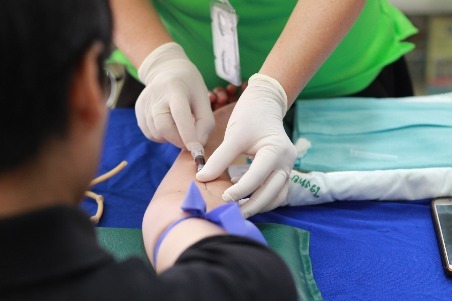People with type 2 diabetes or at risk of type 2 diabetes who are generally fit and healthy can give blood safely. But you can’t give blood if you use insulin to treat your diabetes. That means you can’t give blood if you have type 1 diabetes or if you use insulin and have type 2 diabetes or another type of diabetes.
The NHS Blood and Transplant's policy refuses blood donations from anybody who may be at risk by giving blood. The effect of blood donations on insulin levels is considered a risk to the donor's health. Because of this, people who are dependent on insulin are not permitted to give blood.

You also can't give blood during pregnancy or if you have diabetes complications. This includes kidney problems, nerve damage or amputation. And you can’t give blood if you’ve had heart failure or an organ transplant.
Can you give blood if you have diabetes?
See the information on your type of diabetes below on whether the NHS will accept you as a blood donor. You’ll also need to meet the general rules on who can give blood which include age and weight.
Type 1 diabetes
You can’t give blood as you use insulin.
Type 2 diabetes
You should be able to give blood if you look after your diabetes by diet or using tablet medication. This includes medication that isn’t insulin. And can include injecting medication that isn’t insulin. You’ll need to have been taking the same medication for at least four weeks.
If you've come off insulin or changed your diabetes medication or dose, you'll have to wait for at least four weeks to give blood.
Other types of diabetes
You may be able to give blood if you don’t use insulin to treat your diabetes. The guidance is the same as that for people who have type 2 diabetes above.
Pregnancy
You can't give blood while pregnant. If you have type 2 diabetes (see the guidance for type 2 above) or gestational diabetes, you'll need to wait at least six months after giving birth to give blood.
Get more guidance
If you have diabetes and you’re not sure if you can give blood, see the specific rules on people under 'diabetes' on the health eligibilty listings of the blood.co.uk website. There is also guidance on donating and coronavirus.
How can giving blood affect my diabetes?
After giving blood, the volume of blood in your body returns to normal within a few days. But it takes about 10 to 12 weeks for the red blood cells taken to be fully replaced. This will affect your HbA1c level. So if you've given blood in the three months leading up to an HbA1c blood test, tell your healthcare professional. This will help them to interpret your HbA1c result more accurately.
After giving blood, make sure you follow the rules on resting and eating and drinking something.
Find out where to give blood near you
You may be able to register and book an appointment online or phone for an appointment.
England
Scotland
Scottish National Blood Transfusion Service
Wales
Welsh Blood Service
Main website
Northern Ireland
Northern Ireland Blood Transfusion Service
